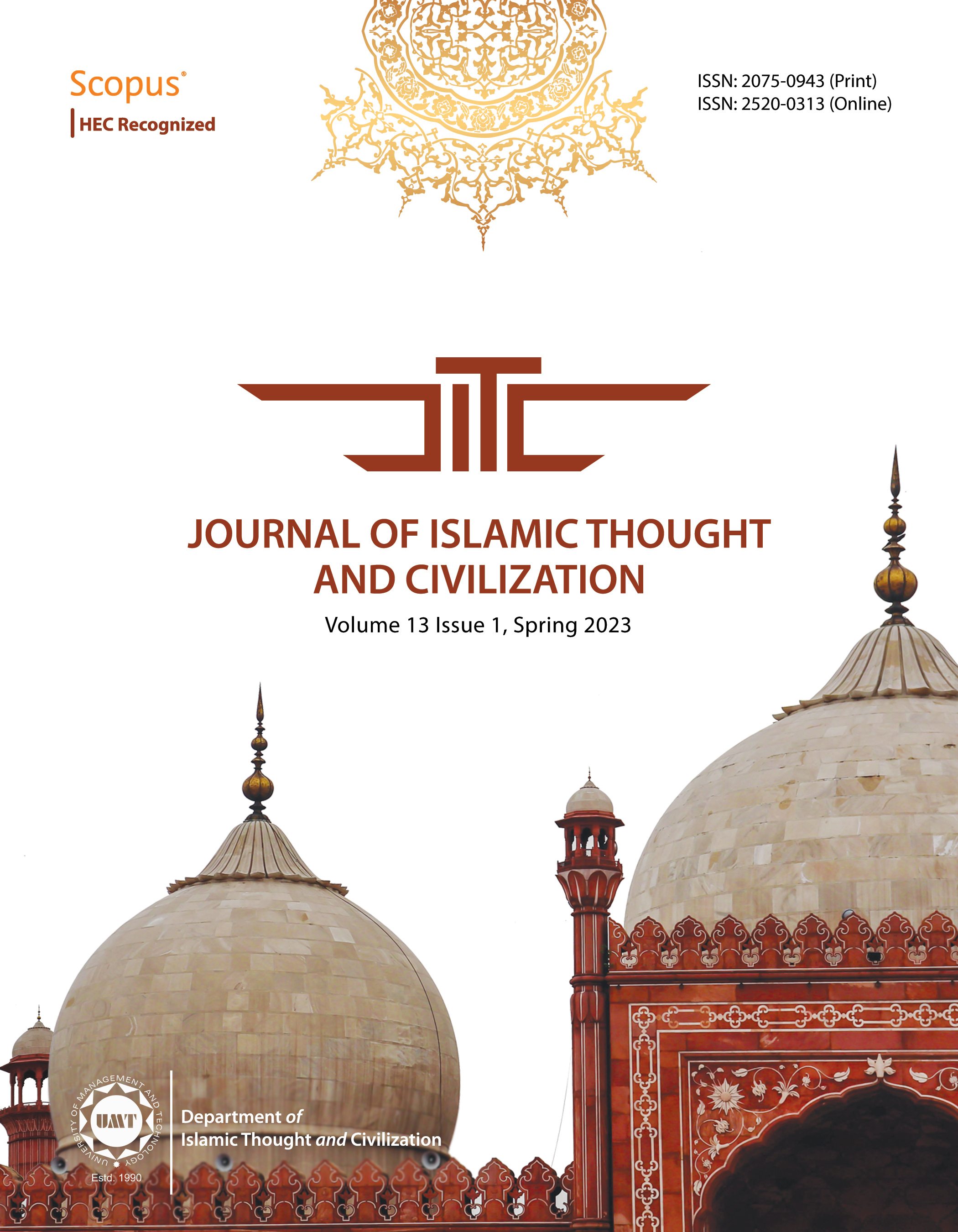Civilizing Role of the “Religious Idea” in Malek Bennabi’s Thought
Abstract
 Abstract Views: 150
Abstract Views: 150
This study examines the perspective of Malek Bennabi regarding the role of religion (religious idea) in building civilization. Bennabi’s writings are analyzed to comprehend his understanding of religion and its multiple dimensions. Specifically, the paper focuses on three dimensions of religion, namely religion as a part of universal laws, as a historical force, and as a governing principle of thought. Bennabi’s view about the civilizing function of religion is also highlighted, including its objectives as outlined in the Quran, its historical significance, and its social dimensions. The study concludes that his perception of religion encompasses various dimensions, including existential, metaphysical, teleological, and practical dimensions. Furthermore, religion serves a crucial role as a compound of civilizational values, providing a medium for individual and group formation, organizing human thought towards spiritual goals, embodying the relationship between God and man, and establishing a moral law that gives meaning to human life and actions. Bennabi’s work on religion and civilization is of utmost significance in contemporary discussions about the role of religion in the society. Hence, this study contributes to the ongoing discourse by providing an in-depth analysis of his perspective, which emphasizes the positive and constructive impact of religion on human society. By recognizing the civilizational function of religion, Bennabi’s work promotes a more nuanced and inclusive understanding of religion in the contemporary society.
Downloads
References
Arif, Kokab. “Islam in History (by Malek Bennabi) (book review).”American Journal of Islamic Social Sciences10, no. 2 (1993): 251-253. http://0-search.proquest.com.mylibrary.qu.edu.qa/scholarly-journals/islam-history-malek-bennabi-book-review/docview/1311887004/se-2 DOI: https://doi.org/10.35632/ajis.v10i2.2512
Barium, Fawzia. “Malik Bennabi and the Intellectual Problems of the Muslim Ummah.” American Journal of Islamic Social Sciences 9 (Fall 1992): 325-37. DOI: https://doi.org/10.35632/ajis.v9i3.2571
Benlahcene, Badrane. “Malek Bennabi’s Concept and Interdisciplinary Approach to Civilization.” International Journal of Arab Culture, Management and Sustainable Development 2, no. 1 (2011): 55-71. DOI: https://doi.org/10.1504/IJACMSD.2011.044896
Bennabi, Malek. Āfāq Jazāʼirīyah [Algerian Horizons]. Cairo: Maktabat ‘Ammar, 1971.
—. al-ẓāhirah al-Qurʼānīyah [the Qur’ānic Phenomenon]. Damascus: Dār al-Fikr, 1984.
—. Fikrat al-Ifrīqiyya al-asyawiyya[The Afro-Asiatism[ . Damascus: Dār al-Fikr, 1981.
—. Mīlād Mujtama‘ [Birth of Society]. Damascus: Dār al-Fikr, 1986.
—. Mushkilat al-afkār fī al-ʻālam al-Islāmī [The Problem of Ideas in the Muslim World]. Damascus: Dār al-Fikr, 1988.
—. Qaḍāyā Kubrā [Grand Matters]. Damascus: Dār al-Fikr, 1991.
—. Shurūt al-Nahḍa ]The Conditions of The Renaissance[. Damascus: Dār al-Fikr, 1981.
—. Ta’ammulāt [Contemplations]. Damascus: Dār al-Fikr, 1986.
—. The Qur'ānic Phenomenon. Translated by Mohamed Tahir Mesawi. Kuala Lumpur: Islamic Book Trust, 2001.
—. Wijhat al-‘Ālam al-Islāmī [The Course of Muslim World]. Damascus: Dār al-Fikr, 1989.
Bernal, John Desmond. al-ʻIlm fī al-Tārīkh [Science in History]. Translated by Shukrī Ibrāhīm Saʻd. Beirut: al-Muʼassasah al-ʻArabīyah lil-Dirāsāt wa-al-Nashr, 1982.
Boussalah, Zahra. “Malek Bennabi: An Analytical Study of His Theory of Civilization.” AMSS 34th Annual Conference “Muslims and Islam in the Chaotic Modern World: Relations of Muslims among Themselves and with Others. Philadelphia: Temple University, 2005.
Huntington, Samual. “The West Unique Not Universal.” Foreign Affairs 75, no. 6 (November/December 1996): 28-46. https://doi.org/10.2307/20047828 DOI: https://doi.org/10.2307/20047828
Al- Khatīb, Sulaiman. Falsafat al-Ḥaḍāra ‘Inda Malek Bennabi [Malek Bennabi’s Philosophy of Civilization]. Herndon: International Institute of Islamic Thought, 1993.
El-Mesawi, Mohamed El-Tahir. A Muslim Theory of Human Society: An Investigation into the Sociological Thought of Malek Bennabi. Batu Caves: Thinker’s Library Sdn. Bhd, 1998.
El-Mesawi, Mohamed El-Tahir. “Malek Bennabi’s Response to Western Modernity: Contextualizing the Qur’ānic Phenomenon.” In Modernity and Globalization Studies in Commemoration of Malik Bennabi, edited by Mohamed El-Tahir El-Mesawi, 1-22. Gombak: IIUM Press, 2014.
Perkins, Mary Anne. Christendom and European Identity: The Legacy of a Grand Narrative since 1789. New York: Walter De Gruyter, 2004. DOI: https://doi.org/10.1515/9783110914610
Talbi, Ammar. “The Implication of Malek Bennabi’s View on Contemporary Muslim Society.” The International Seminar on Malek Bennabi. Kuala Lumpur: University Malaya, 1991.
Toynbee, Arnold. Change and Habit. Oxford: One World Publications, 1992.
Copyright (c) 2023 Badrane Benlahcene

This work is licensed under a Creative Commons Attribution 4.0 International License.

This work is licensed under a Creative Commons Attribution 4.0 International License. Authors retain copyright and grant the journal right of first publication with the work simultaneously licensed under a Creative Commons Attribution (CC-BY) 4.0 License that allows others to share the work with an acknowledgement of the work’s authorship and initial publication in this journal.








